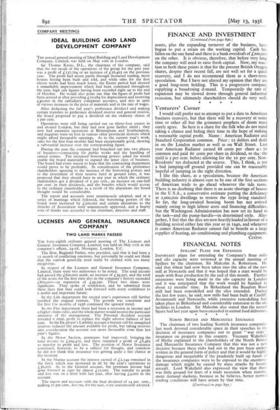COMPANY MEETINGS
IDEAL BUILDING AND LAND DEVELOPMENT COMPANY
THE annual general meeting of Ideal Building and Land Development Company, Limited, was held on May loth in London.
Sir Thomas Keens, D.L., the chairman of the company, said that the net result of the operations of the group for the past year was a profit of £137,704 or an increase of £56,403 on the previous ' year. The profit had arisen partly through increased trading, more houses having been built and sold, and while sales for the first ' eleven weeks had been much lower, the Easter period had showed a remarkable improvement which had been continued throughout the year, high sale figures having been recorded right up to the end of October. He would also point out that the figure of profit had been arrived at after providing £10,084 for depreciation and reserving £40,000 in the subsidiary companies accounts, and also in spite of various increases in the price of materials and in the rate of wages.
After deducting the full year's preference dividend and making certain transfers to preference dividend reserve and general reserve, the board proposed to pay a dividend on the ordinary shares of 5 per cent.
Operations were still being carried out on thirty-four estates in and around London, but they had now gone farther afield ; they now had extensive operations at Birmingham and Southampton, and inquiries were on foot in various other provincial districts which might afford favourable openings. As to the current year's work, sales for the first four months had been exceptionally good, showing a substantial increase over the corresponding figure.
During the year the company had branched out into two phases of business—contracting for public works and the handling of rented estates. The increased borrowing powers asked for would enable the board materially to expand the latter class of business. The board had every reason to hope that the contracting department would prove to be profitable. In consideration of the preference shareholders agreeing to the increase of the borrowing powers and to the investment of their reserve fund in ground rents, it was proposed that they should have in any year in which the ordinary shareholders got a dividend of 5 per cent., an increase on one-half per cent. in their dividends, and the benefits which would accrue to the ordinary shareholder as a result of the alterations the board thought would be considerable.
The report and accounts were unanimously adopted, and at a series of meetings which followed, the borrowing powers of the board were increased by £500,000 and certain alterations to the Articles of Association were unanimously approved, and a hearty vote of thanks was accorded to the chairman, directors and staff.














































 Previous page
Previous page